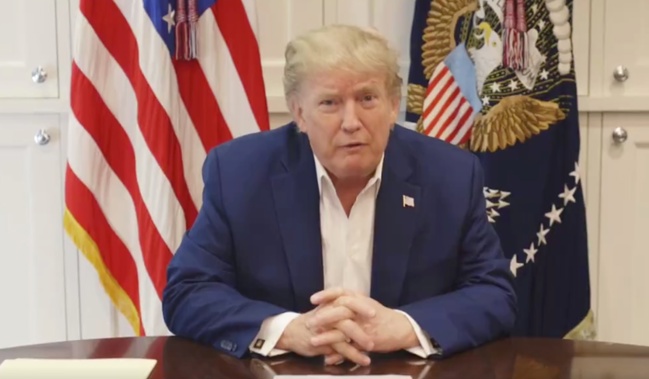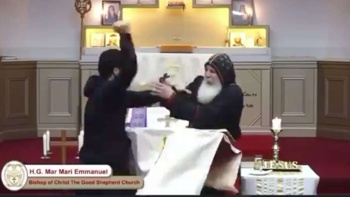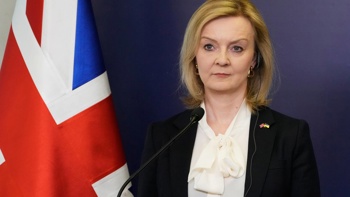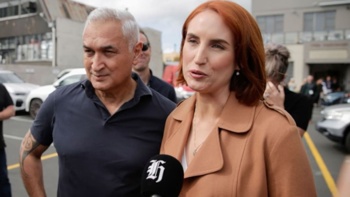
A slightly hoarse and pale Donald Trump has issued a four-minute video on Twitter, saying he "wasn't feeling so well" when he was admitted to hospital - but was starting to feel better.
Trump thanked medical professionals at the Walter Reed National Military Medical Center.
"I came here, wasn't feeling so well, I feel much better now we're working hard to get me all the way back, I have to be back because we still have to make America great again," he said.
He said he was starting to "feel good" but said he did not know what would happen over the next few days: "I guess that's the real test."
In the video he said he thought he would be back soon: "I look forward to finishing up the campaign."
— Donald J. Trump (@realDonaldTrump) October 3, 2020
He said he was fighting for the millions of people who have also contracted the virus "all over the world".
"We are going to beat this coronavirus or whatever you want to call it,"
He called the therapeutics "miracles coming down from god".
Trump said he chose to be taken to the hospital, saying he had the option to stay at the White House.
But he said he couldn't do that due to the strict social distancing and quarantine measures that he would be under.
"This is America, this is the United States, this is the greatest country in the world, this is the most powerful country in the world, I can't be locked up in a room upstairs."
The video come as the doctors treating President Donald Trump for Covid-19 created confusion with remarks during a briefing that appeared to shift the timeline of Trump's positive coronavirus test and treatment. Trump's physician, Dr. Sean Conley, released a statement afterward to try to clarify the comments.
Trump posted on Twitter around 1 a.m. Friday that he and first lady Melania Trump had tested positive for the coronavirus, and the White House announced Friday afternoon he had been treated with Regeneron's experimental antibody therapy.
But during a briefing just before noon on Saturday, Conley said that Trump was "just 72 hours into the diagnosis now," which would have put his diagnosis at midday Wednesday. Another physician, Dr. Brian Garibaldi, said Trump was treated with an experimental antibody therapy "about 48 hours ago," which would have been midday Thursday.
The doctors did not address the timing discrepancies during the briefing, but Saturday afternoon, Conley released a memo aimed at clarifying the timeline.
"This morning while summarizing the President's health, I incorrectly used the term 'seventy two hours' instead of 'day three' and 'fourth eight hours' instead of 'day two' with regards to his diagnosis and the administration of the polyclonal antibody therapy.
"The President was first diagnosed with COVID-19 on the evening of Thursday, October 1st and had received Regeron's antibody cocktail on Friday, October 2nd."
The memo had misspellings, including the name of Regeneron, the name of the company that makes the treatment Trump received. A spokesperson for Regeneron told CNN that the treatment was a monoclonal antibody treatment, not a polyclonal antibody treatment. The memo also did not note that the 48-hour remark was made by Garibaldi, not Conley.
A positive Covid-19 test midday Wednesday and use of an experimental treatment midday Thursday would move up significantly the timeline of Trump's illness.
On Tuesday night, Trump participated in the first presidential debate. Cleveland Clinic, which hosted the debate, confirmed to CNN that it required everyone in the debate hall to have a negative Covid-19 test, but did not say when tests needed to be taken, what tests were used or how campaigns were required to disclose test results.
On Wednesday, Trump visited Minnesota. And on Thursday -- after Trump aide Hope Hicks had developed symptoms -- the President attended a Bedminster, New Jersey, fundraiser that included an indoor roundtable, an indoor VIP reception with a socially distant photo-op and outdoor reception.
A confusing timeline
Despite saying Trump was 72 hours into his diagnosis, Conley also said during Saturday's briefing at Walter Reed National Military Medical Center that Trump tested positive for coronavirus late Thursday night. Conley would not say when Trump's last negative Covid-19 test took place.
"I'm not going to get into all the testing going back," Conley said during the Saturday briefing. "But he and all the staff ... routinely are tested."
When asked about the 72-hour remark, Conley said, "So Thursday afternoon following the news of a close contact is when we repeated testing.
"And given kind of clinical indications we had a little bit more concern. And late that night we got the PCR confirmation that he was..." Conley said, trailing off.
During the same Saturday briefing, Garibaldi, one of the team of doctors treating Trump at the Walter Reed, told reporters Trump was treated with an experimental antibody therapy "about 48 hours ago," which would have been midday Thursday.
"About 48 hours ago, the President received a special antibody therapy directed against the coronavirus," Garibaldi said just before noon on Saturday.
Conley had said in a memo released Friday afternoon, "Following PCR-confirmation of the President's diagnosis, as a precautionary measure he received a single 8 gram dose of Regeneron's polyclonal antibody cocktail." The memo did not specify when the PCR confirmation took place.
Regeneron has confirmed it provided a single 8-gram dose of its antibody therapy to be used by Trump, but did not specify when it received the request.
with text by Jamie Gumbrecht and Maggie Fox, CNN and NZ Herald
Take your Radio, Podcasts and Music with you








